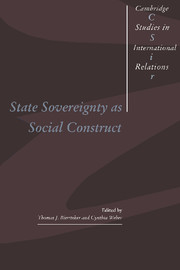Book contents
- Frontmatter
- Contents
- List of figures
- List of contributors
- Acknowledgments
- 1 The social construction of state sovereignty
- 2 Contested sovereignty: the social construction of colonial imperialism
- 3 Beyond the sovereignty dilemma: quasi-states as social construct
- 4 The sovereign state system as political-territorial ideal: historical and contemporary considerations
- 5 Sovereignty and the nation: constructing the boundaries of national identity
- 6 Sovereignty, nationalism, and regional order in the Arab states system
- 7 Binding sovereigns: authorities, structures, and geopolitics in Philadelphian systems
- 8 Hierarchy under anarchy: informal empire and the East German state
- 9 Reconstructing the analysis of sovereignty: concluding reflections and directions for future research
- Index
- Titles in the series
6 - Sovereignty, nationalism, and regional order in the Arab states system
Published online by Cambridge University Press: 01 June 2011
- Frontmatter
- Contents
- List of figures
- List of contributors
- Acknowledgments
- 1 The social construction of state sovereignty
- 2 Contested sovereignty: the social construction of colonial imperialism
- 3 Beyond the sovereignty dilemma: quasi-states as social construct
- 4 The sovereign state system as political-territorial ideal: historical and contemporary considerations
- 5 Sovereignty and the nation: constructing the boundaries of national identity
- 6 Sovereignty, nationalism, and regional order in the Arab states system
- 7 Binding sovereigns: authorities, structures, and geopolitics in Philadelphian systems
- 8 Hierarchy under anarchy: informal empire and the East German state
- 9 Reconstructing the analysis of sovereignty: concluding reflections and directions for future research
- Index
- Titles in the series
Summary
In the first address to the French Parliament by a US president since Woodrow Wilson, President Clinton spoke in June 1994 of the growing challenge posed by nationalism to democracy and international stability. In contrast to Wilson, who went to Paris after the war to champion the idea of national self-determination as the foundation for a more just and stable international order, Clinton arrived after the Cold War to warn that nationalism frequently leads to humanitarian nightmares and international instability. At present, nationalism is identified less with cultural autonomy, freedom, democracy, and sovereignty than it is with chauvinism, expansionism, and assaults on the Westphalian order. If few practitioners or students of security politics fully considered during the Cold War the importance of nationalism, they have been forced into this consideration by the fact that some of the most important sources of regional and international instability are clearly rooted in contending national and ethnic claims and the failure of the state to capture the loyalties of its citizens. Scholars and policymakers are less likely to write of nation-states than they are of nations against states.
The explosive mix of nationalism and state sovereignty is well known to students of Arab politics. Since the beginning of the Arab states system in the 1940s, there has been a vigorous debate over the meaning of Arab nationalism and its implication for inter-Arab practices.
- Type
- Chapter
- Information
- State Sovereignty as Social Construct , pp. 148 - 189Publisher: Cambridge University PressPrint publication year: 1996
- 4
- Cited by



